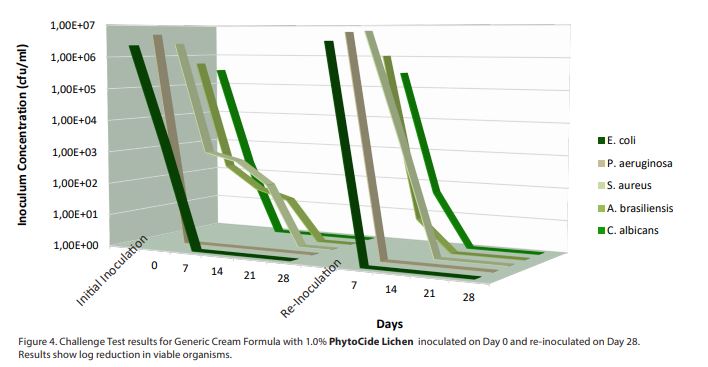PhytoCide Lichen
Background
Innovations in naturally derived antimicrobials have continued to advance as consumers push for alternatives to synthetic preservatives. The use of natural alternatives to prevent microbial growth is not as simple as an ingredient substitution. Natural preservation requires special attention to formula details such as optimal pH, temperature, and charge. Current alternatives offer effective microbial protection under mild conditions of pH and temperature. Limited natural options are available for anionic systems. Lichens are a complex life form that is a symbiotic partnership of two separate organisms, a fungus, and an alga. In symbiosis, we explore the antimicrobial ability of a lichen extract on anionic formulations for the cosmetic and personal care market.
Science
The lichen metabolite usnic acid exhibits various types of biological activity, most notably antimicrobial activity against plant and human pathogens, including inhibitory activity against bacterial strains resistant to antibiotics. Lichens are able to create more than one thousand secondary metabolites, with usnic acid being one of the most abundant. Lichen secondary metabolites can be a source of energy for soil microorganisms and at the same time, they can inhibit the growth of surrounding competitive lichens, mosses, and vascular plants.
Benefits
Cladonia rangiferina also called and known as “reindeer lichen”, is a fruticose that grows in boreal forests. The name is coming from the fact that it serves as a pasture for reindeer, moose, caribou, and musk oxen. Covering large areas, this lichen is able to grow in both hot and cold environments. By using our unique fermentation technique, Active Micro Technology was able to create Phytocide Lichen from Cladonia Rangiferina, a unique active rich in usnic acid. This ingredient provides broad-spectrum protection for cosmetic applications
with good compliance in the anionic system
Use Recommendations
PhytoCide Lichen is non-ionic and water-soluble and may therefore be added to aqueous systems, as well as the aqueous phase of emulsions. When using PhytoCide Lichen it is recommended to maintain the formulation pH between 3 and 8. We also suggest incorporating the product at temperatures of 25°C or below. When handling this product please prevent exposure to temperatures above 25°C and prolonged exposure to UV. Exposure to temperatures above 25°C and direct UV may cause darkening.

